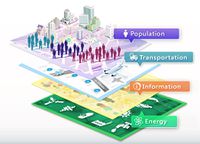Lesson 4
Jump to navigation
Jump to search
|
|
|
|
|
Course Resourceshttps://wiki.smu.edu.sg/1920t1smt201/Lesson_Plan |
Thematic Mapping and Cartographic Design
Contents
Content
Thematic Mapping and Geovisualization
- Qualitative maps: visual variables and cartographic symbols
- Quantitative maps: data scaling, data classification, and principles of colour
- Mapping movement, change, and process
- Map composition and map symbolization
- Map design
Map Analysis Techniques
- Map reading techniques
- Visualising statistical data
Readings
Core Reading (Highly recommended)
Additional Readings
- Choropleth map
- Choropleth Maps – A Guide to Data Classification
- Bivariate Choropleth
- Value-by-alpha maps
- What to consider when creating choropleth maps
- Choropleth Mapping with Exploratory Data Analysis
- Cartogram Maps: Data Visualization with Exaggeration
- Cartogram
QGIS methods
General readings
- Cartography [1]
- Thematic Mapping [2]
- GeoVisualization [3]
- Web mapping [4]
- Choropleth Mapping with Exploratory Data Analysis [5]
- Take Care of your Choropleth Maps [6]
- Map Design [7]
- Visual Variables [8]
- ColorBrewer [9]
- Cartographic Text[10]
- A Cartographic Data Model for Better Geographical Visualization based on Knowledge [11]
References
Slocum, T., McMaster R., Kessler, F. and Howard, H. (2005) Thematic Cartography and Geographic Visualization (2nd Edition), Prentice Hall, New Jersey.
Kraak, M-J & Ormeling, F. (2003) (2nd Edition) Cartography: Visualization of Geospatial Data. Pearson Education Limited, Essex, England.
Monmonier, M. (1996) How to Lie with Maps, The University of Chicago Press, USA.
Examples You Should NOT Miss
Chloropleth Map Classification Systems [12]
